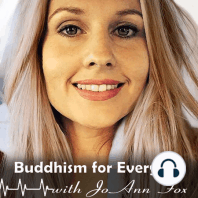58 min listen

Episode 172 - Releasing Negative Self Concepts
Episode 172 - Releasing Negative Self Concepts
ratings:
Length:
37 minutes
Released:
Jul 20, 2023
Format:
Podcast episode
Description
In Buddhism, the concept of "emptiness" (Sunyata) is a fundamental teaching that refers to the absence of inherent existence or independent selfhood. All things, including our self, are empty of inherent existence. The notion of a fixed, permanent, and independent self is an illusion. The concept of emptiness is closely associated with the teaching of dependent origination (Pratityasamutpada), which explains that all phenomena arise and exist dependently on other factors. In other words, everything in existence is interdependent and lacks a separate, inherent essence. When applied to the self, emptiness suggests that there is no autonomous, enduring self that exists apart from the ever-changing and interconnected nature of phenomena. Instead, the self is regarded as a fluid, composite entity, constantly influenced and shaped by various causes and conditions. Belief in a substantial, inherently existing self leads to attachment, craving, and suffering. It is a form of ignorance (avidya) that obscures the true nature of reality. By understanding emptiness of the self, one can overcome attachment, cultivate wisdom, and ultimately attain liberation from the cycle of suffering (Samsara). It is important to note that emptiness does not imply nihilism or the non-existence of the self. Rather, it emphasizes the lack of inherent, independent existence. The self does exist conventionally; it is a conventional designation. Understanding conventional truth, we see how labeling all the things in our world allow us to interact with each other and do things. The self we relate to is a product of interdependent causes—always changing—rather than an enduring, fixed entity. Conventionally we do function in certain ways. Actions of body, speech and mind are generally beneficial, neutral, or harmful. Most actions are neutral: breathing, brushing our hair, driving unless we’re cutting someone off or something. If most of our actions are beneficial or neutral, that would cause people to label us as a good person. If a person does profoundly harmful things to others, with few good actions and many neutral actions, people would probably label them a bad person. Someone who frequently steals or physically abuses their partner, for example, might be labeled a bad actor who needs to be off the streets. But if that same bad actor turned his life around and started performing many good and beneficial actions while stopping their harmful actions, they would then be labeled a good person. Labels like good and bad are not stuck to a person, they aren’t inherent, because the way a person functions changes. All the labels we’ve been called from “hardworking” to “angry” only exist for as long as we function in a way that supports that label. We can change. We aren’t inherently anything. A blade can be used to kill someone in anger, then it’s a weapon, or it can be used as a tool to cook a nutritious meal. The blade could be a surgical instrument to remove a tumor. Whether we call it a weapon or a tool for good depends on how it is used. That is the same with our body and minds. Do we mainly use our speech as a tool for good or a weapon? Because we are an empty self, we can change and function in any way we choose. By changing certain ways we function, we will be able to let go of painful labels and exist in more healthy ways. To look honestly at ways we are functioning that harm ourselves or others requires compassion for ourselves. Compassion is the wish that someone doesn’t suffer, and it is a warm, loving mind. Practicing this self compassion helps us to see that we are a Buddha in the making, currently caught in the thorns of anger, attachment, and ignorance. Rather than grasping at our deficiency, we try to develop the compassion that sees our limitations as temporary. In fact, we simply need to create the causes to experience the permanent peace and bliss of enlightenment. Buddha taught that for all beings, our destiny is enlightenment
Released:
Jul 20, 2023
Format:
Podcast episode
Titles in the series (100)
Episode 21: Karma Therapy: Karma therapy is the practice of trying--every day--to create as much good karma as possible. Karma therapy is also refraining from actions that create negative karma, namely, actions that harm ourselves or others. In the daily practice that follows... by Buddhism for Everyone with JoAnn Fox